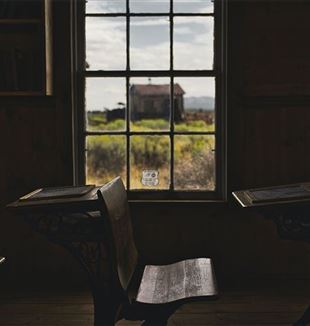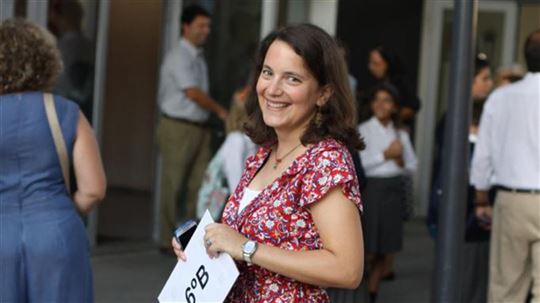
Change of plans
After years of teaching in which she planned every detail thoroughly, Luísa Costa Cabral found her work shaken up by the coronavirus pandemic. Now it is time to return to school in Lisbon, in September Traces, she reflects on what has happened to her.Pedro, where are you? I can’t hear you. Antonio, are you there?” She calls on them one by one. “I had no other concern than being with them,” recounts Luísa Costa Cabral, who teaches students in what for Portugal is the fifth year of elementary school and the first year of middle school. Giving up “other concerns” may seem banal but not for her. “I am methodical and precise. Usually in July I already have the coming year’s program of study defined and ready. I need to. In twelve years of teaching, it’s something that has always made me feel calm.” Even unexpected things were always planned for to the extent possible, or “at least taken into consideration as possibilities that could be controlled.”
The emergency was proclaimed on a Monday in March. On that Wednesday, some students of the big Colégio de São Tomás in Lisbon were diagnosed with Covid, and on Friday the school was closed. “All the teachers met to organize distance learning, and in the meantime we began right away to send work material to the students.” This was an unforeseen event, and this time there was no controlling it. “In the past, if there was a class trip, for example, I always knew how I wanted to resume our work; I had everything planned. Instead, with this situation, something had to change in me,” she says on the eve of the new academic year, speaking of what she discovered and what she no longer wants to do without. In Lisbon the number of new cases does not seem to be lessening and even though school is set to reopen soon, its future is uncertain. But her experience in the past months enables her to look ahead optimistically.
Few schools adopted distance learning. “The government organized lessons on television, but we chose to stay with the students during distance learning.” The school launched a campaign–iPede [which means “I ask”], which in Portuguese sounds like IPad, the famous tablet–to ensure that all of its students would have the devices needed, since “about 20 percent of our 1,000 students come from families with modest incomes and are here on scholarships.” The distance learning began one step at a time and now involves four hours a day plus some afternoon sessions.
“I was strangely peaceful during the video lessons. I wasn’t really confident in the programs but I was only really concerned about my relationship with them. I was amazed at myself.” Where did this serenity come from? “I discovered that a preplanned program of study is not what forms a bond with the students, a bond that motivates all the work you do during the hours with them in the classroom and drives you to give your all, and you cannot be with the students when they are at home. This bond emerges only to the extent that I am in a relationship with something else.”
The key for starting again now is this discovery, which happened over time and was only understood after months of lockdown. “Analyzing the situation or looking at the number of Covid cases does not provide serenity.” As she was preparing for the new academic year, she reflected on Julián Carrón’s letter to the movement of CL and his invitation to look at those who lived the experience in a more interesting way. “In the past few months I have begun to keep in mind the stories of people who faced circumstances in a different way. I also thought about the pope and his gestures and about some friends. Then in June when I saw the students about their report cards, I understood that my relationship with them had been saved. I had looked at them in the way I had been looked upon and accompanied as I followed the church and the Movement.”
This helps her now in starting again with the new academic year. “The relationship I have with them in class can, like a submarine, remain below the surface but not disappear. It can be reduced to the essential without being eliminated; it merely takes on a different quality or form.” Clearly, lessons in person are another thing. “We have to return to the classroom, and it can’t happen soon enough for us. But in whatever form it may take, it will be part of the same journey we are called to make, one that concerns opportunities for growth and relationship.” It was not easy, she explains, think- ing back over the past months. During the online lessons, many of the students got distracted and did other things like watching videos, disrupting classmates, even petting cats or cuddling younger siblings. “But nobody was lost.” She says that she called all the parents early on, and one was worried that her son was not following the lessons. “I told her that he had spoken up during a lesson to share with his classmates his pain about his uncle’s death from Covid. She was moved.” With another boy, she had to take disciplinary action because of a series of things he had done. “He would have preferred to transfer to another school, but I explained to him that I had made some choices because I wanted the best from him. He accepted that. His mother called me and said that he had cried, but then became more peaceful. He felt that I was looking at him, paying attention to him. At ten years old, how is that possible? Many other students felt this, too: they saw and recognized something about this relationship.”
Read also - Starting again
This has been the case with her colleagues as well. “It’s been hard not having a teacher’s room where we can compare ideas and experiences. Often this happens by accident. Instead, I sought them out by phone with a new freedom to discuss how to live to the full what was happening.” She found that she was more herself. She adds, “The new academic year coming up is an unknown. We reopen soon, and are working on all the possible scenarios. I’m still preparing my program of studies but it’s not the same as before. As I heard once, the gift of history always changes our plans. It’s an exciting challenge.”
She says she saw this same enthusiasm in a student who is about to start high school, “an adventure that students generally look forward to,” Luísa continues. “But while she was home during lockdown, she wrote me to say ‘I don’t want to just wait for things to change. I want to enjoy what I am living.’” The opportunity is now. “‘Not having lived,’ as happened to me in some way before isn’t a problem. You can begin now; you can always begin now.”